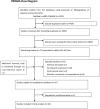BRCA mutations and survival in breast cancer: an updated systematic review and meta-analysis
- PMID: 27659521
- PMCID: PMC5342539
- DOI: 10.18632/oncotarget.12158
BRCA mutations and survival in breast cancer: an updated systematic review and meta-analysis
Abstract
BRCA mutations occur frequently in breast cancer (BC), but their prognostic impact on outcomes of BC has not been determined. We conducted an updated meta-analysis on the association between BRCA mutations and survival in patients with BC. Electronic databases were searched. The primary outcome measure was overall survival (OS), and the secondary outcome measures included breast cancer-specific survival (BCSS) and event-free survival (EFS). Hazard ratios (HR) and 95% confidence interval (CI) were abstracted and pooled with random-effect modeling. Data from 297, 402 patients with BC were pooled from 34 studies. The median prevalence rates of BRCA1 and BRCA2 mutations were 14.5% and 8.3%, respectively. BRCA mutations were associated with worse OS (BRCA1: HR = 1.69, 95% CI, 1.35 to 2.12, p < 0.001; BRCA2: HR = 1.50, 95% CI 1.03 to 2.19, p = 0.034). However, this did not translate into poor BCSS (BRCA1: HR = 1.14, 95% CI, 0.81 to 1.16, p = 0.448; BRCA2: HR = 1.16; 95% CI 0.82 to 1.66, p = 0.401) or EFS (BRCA1: HR = 1.10, 95% CI, 0.86 to 1.41, p = 0.438; BRCA2: HR= 1.09; 95% CI 0.81 to 1.47, p = 0.558). Several studies analyzed BRCA1 and BRCA2 mutations together and found no impact on OS (HR = 1.21; 95% CI, 0.73 to 2.00, p = 0.454) or EFS (HR = 0.94; 95% CI, 0.60 to 1.48, p = 0.787). BRCA1 and BRCA2 mutations were associated with poor OS in patients with BC, but had no significant impact on BCSS or EFS. An improved survival was observed in BC patients who had BRCA1 mutation and treated with endocrinotherapy. The results may have therapeutic and prognostic implications important for BRCA mutation carriers with BC.
Keywords: BRCA mutation; breast cancer; meta-analysis; survival; systematic review.
Conflict of interest statement
None.
Figures




References
-
- Hall JM, Lee MK, Newman B, Morrow JE, Anderson LA, Huey B, King M-C. Linkage of early-onset familial breast cancer to chromosome 17q21. Science. 1990;250:1684–1689. - PubMed
-
- Lenoir G, Lynch H, Watson P, Conway T, Lynch J, Narod S, Feunteun J. Familial breast-ovarian cancer locus on chromosome 17q12-q23. The Lancet. 1991;338:82–83. - PubMed
-
- Wooster R, Neuhausen SL, Mangion J, Quirk Y, Ford D, Collins N, Nguyen K, Seal S, Tran T, Averill D. Localization of a breast cancer susceptibility gene, BRCA2, to chromosome 13q12–13. Science. 1994;265:2088–2090. - PubMed
-
- Wang F, Fang Q, Ge Z, Yu N, Xu S, Fan X. Common BRCA1 and BRCA2 mutations in breast cancer families: a meta-analysis from systematic review. Molecular biology reports. 2012;39:2109–2118. - PubMed
Publication types
MeSH terms
LinkOut - more resources
Full Text Sources
Other Literature Sources
Medical
Miscellaneous

